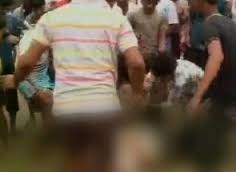Bengaluru, Aug 7: The Karnataka government would provide Rs 10,000 immediate relief to families affected by heavy rains and flooding in districts across coastal, central and southern areas of the state, an official said on Thursday.
"Chief Minister B.S. Yediyurappa has directed all the Deputy Commissioners in the rain-cum-flood-hit districts to provide Rs 10,000 interim relief to the affected families and Rs 5 lakh to those whose houses were completely damaged in the natural disaster," a Revenue Department official told media persons here.
As the south-west monsoon advanced and intensified, heavy and widespread rains with gusty winds have been lashing 12 of the 30 districts across the state, wreaking havoc and disrupting normal life due to flooding, landslides, lakes and ponds overflowing, and rivers and their tributaries in the spate.
"The Chief Minister also instructed the officials to make use schools, colleges and public places as relief centres to shelter the rain-cum-flood-hit families, as hostels and community halls have been converted into Covid care centres in the affected districts," said the official.
The affected districts have also been advised to conduct a survey of crop loss suffered by farmers for compensation under the centrally-sponsored Pradhan Mantri Fasal Bima Yojana and the Weather Based Crop Insurance Schemes.
Deputy Commissioners have been told to take preventive measures to protect and provide relief to the people from heavy rains, floods and landslides in the affected districts.
"Yediyurappa also directed ministers in-charge of the districts to remain in their constituency and visit the affected areas to assess damage caused by the rains and flash floods for compensation and relief aid," noted the official.
The Chief Minister on Wednesday announced Rs 50 crore for rescue and relief operations in the affected districts across the state.
Meanwhile, the Meteorological department has issued a red alert on heavy rains in the affected districts of Kodagu, Udupi, Dakshina Kannada and Uttar Kannada in the coastal region and in Shivamoga, Chikkamagaluru, Hassan and Haveri in the Malnad region.
"Bagamandala in Kodagu district where Cauvery river springs near Talakaveri received a whopping 486 mm rain during the last 24 hours, causing flash floods and disrupting normal life as offices, shops and eateries remained shut and public transport was affected," added the official.
The water-level in Cauvery and Lakshmanatheertha is flowing at high level while the Sayi layout and Kuvempu layout Kushalnagar is inundated and the affected residents were shifted to safer location.
 The police have arrested M.A. Thomas (54), Saju Thomas (38) and Antony (54) for allegedly beating Peter to death.
The police have arrested M.A. Thomas (54), Saju Thomas (38) and Antony (54) for allegedly beating Peter to death.




Comments
nobody can stop us !!!!
nobody can take law in hand, this is totally wrong.
Rightly done very good job. if this people handed over him to police, they will release him in week because 50% of theft shares police will get.
who r these people to punish him, all the culprit must be punished by law.
nobody can take law on hand, everyone must be punished for making crime.
Add new comment